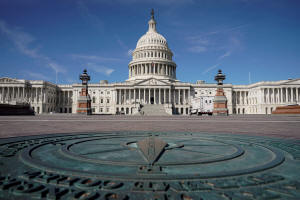|
With government funding for federal agencies due to expire at
midnight, House lawmakers sent the legislation on to the White
House, where President Joe Biden signed the measure into law.
The bill, which includes an additional $12.3 billion for
Ukraine's war effort against the Russian invasion, passed the
100-seat Senate on Thursday with bipartisan support. But it
faced opposition in the House from Republicans including party
leader Kevin McCarthy, and less than a dozen Republicans joined
all Democrats present in approving the bill in a vote of 226 to
200.
Without its passage, government agencies would have been forced
to partially shut down on Saturday for lack of funding - a
scenario which has become increasingly common in a deeply
partisan era of U.S. politics, as both parties fight over budget
allocations.
In addition to Ukraine aid and funding for government agencies,
the bill authorizes Biden to direct the drawdown of up to $3.7
billion for the transfer to Ukraine of excess weapons from U.S.
stocks.
Amid reports of Russian forces threatening the safety of
Ukraine's nuclear power plants and Russian President Vladimir
Putin hinting he might use nuclear weapons against Ukraine, the
legislation would appropriate $35 million "to prepare for and
respond to potential nuclear and radiological incidents in
Ukraine," according to a bill summary.
The stopgap bill also includes a five-year renewal of Food and
Drug Administration user fees being collected from drug and
medical device companies to review their products and determine
whether they are safe and effective, the bill summary showed.
The law authorizing the collection of fees expires on Friday.
Congress has resorted to this kind of last-minute temporary
spending bill in 43 out of the past 46 years due to its failure
to approve full-year appropriations in time for the Oct. 1 start
of a fiscal year, according to a government study.
The last time Congress allowed funding to lapse was in December
2018, when Democrats balked at paying for then-President Donald
Trump's U.S.-Mexico border wall, leading to a record, 35-day
impasse and partial government shutdown.
(Reporting by Moira Warburton, David Morgan and Richard Cowan in
Washington; Editing by Scott Malone, Deepa Babington, Jonathan
Oatis and Diane Craft)
[© 2022 Thomson Reuters. All rights
reserved.] Copyright 2022 Reuters. All rights reserved. This material may not be published,
broadcast, rewritten or redistributed.
Thompson Reuters is solely responsible for this content.

|
|




